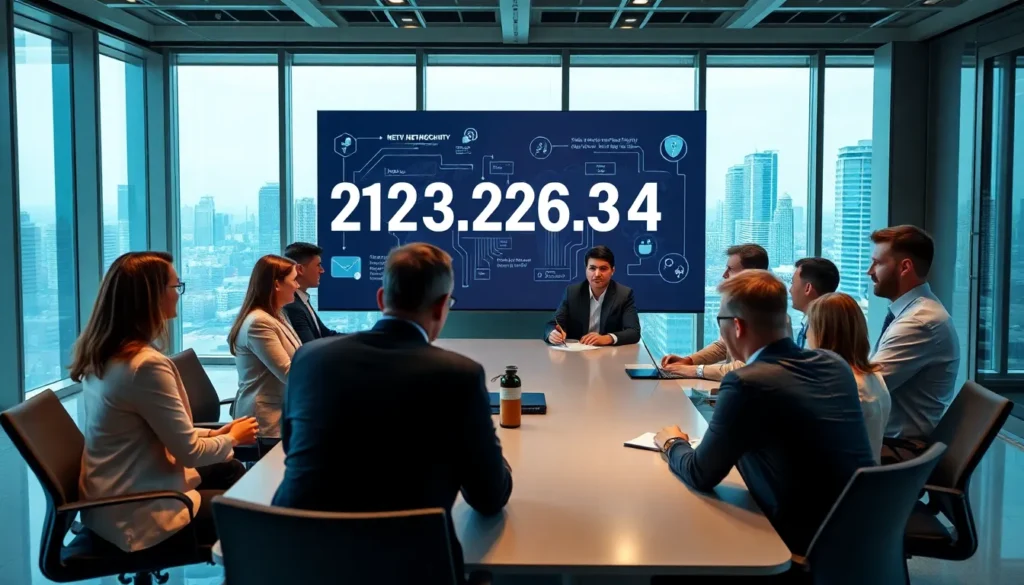
Ever tried to explain to your tech-savvy friend what an IP address is and watched their eyes glaze over? It’s okay: it happens to the best of us. Welcome to the intriguing realm of IP addresses, where numbers can be just as important as your best pizza toppings. In this guide, we dive deep into what makes IP addresses tick, with a sprinkle of humor and a whole lot of insight. So, grab your favorite beverage, and let’s get started on this digital adventure.
212.32.226.324

An IP address, short for Internet Protocol address, acts as a unique identifier for devices on a network. Picture it like your home address but for your computer or smartphone. Every device connected to the internet boasts its own IP address, which allows it to send and receive information efficiently.
An IP address comes in two main versions: IPv4 and IPv6. IPv4, the more common format, consists of four sets of numbers, like this: 192.168.0.1. Each set can range from 0 to 255. Meanwhile, IPv6 was developed to overcome the limitations of IPv4 as the latter began to run out of available addresses, yes, the internet is that popular. IPv6 uses a hexadecimal format and can accommodate a staggering number of unique addresses.
Types of IP Addresses
IP addresses can be classified into two main categories: public and private. A public IP address is visible on the internet, much like a billboard on a highway. It’s assigned by your Internet Service Provider (ISP) and is associated with your home network. In contrast, private IP addresses are used within local networks. They can be likened to apartment numbers within a building: they help identify specific devices behind a single public address.
Also, dynamic IP addresses are frequently assigned and can change each time you connect to the internet. Think of them as your internet connection’s disguise. On the other hand, static IP addresses remain constant and are often used for hosting websites or services that need to be consistently reachable.
Decoding the IP Address 212.32.226.324
The IP address 212.32.226.324 may raise eyebrows or even curiosity. But let’s peel back the layers and explore its significance.
Geolocation of IP Address 212.32.226.324
When looking at the geolocation of 212.32.226.324, it’s like revealing where a secret agent is based. Tools or databases can help identify the country, city, and even the ISP associated with this address. This kind of information can help in tracking online activity and ensuring cybersecurity, but it also raises questions about privacy.
Common Uses of 212.32.226.324
This IP address could be utilized in various situations, from facilitating online gaming sessions to powering a corporate website. ISPs often assign IP addresses for different purposes, making it essential for anyone working with network configurations to understand how certain addresses might be used in different contexts.
Security Implications of IP Address Analysis
Analyzing IP addresses, like 212.32.226.324, can have significant security implications. Businesses often monitor IP address activities to detect potential threats such as hacking attempts or unauthorized access. By understanding the traffic associated with specific addresses, organizations can carry out stronger security measures, making the digital environment safer for everyone.
But, this doesn’t come without challenges. Misusing IP address information can lead to violations of privacy and data protection regulations, raising ethical dilemmas in cybersecurity practices. It’s always a tightrope walk between security and privacy.
How to Perform an IP Lookup
Performing an IP lookup is easier than finding the last slice of pizza at a party. Numerous online tools can help you check details linked to an IP address, including the geolocation, ISP information, and whether the IP is blacklisted.
To conduct a successful IP lookup, simply enter the IP address into one of these tools, and voilà. Instant information served. This practice can help troubleshoot network issues, enhance cybersecurity measures, and even aid in investigating online threats.
Staying Safe While Browsing: Importance of IP Privacy
IP privacy is more crucial than ever in today’s web-centric world. Each time you browse, your unique IP address gets recorded, making it easier for third parties to track your online behavior. To stay protected, consider using tools like VPNs (Virtual Private Networks) or proxies that mask your IP address. This is like wearing a clever disguise at a masquerade party: it keeps your identity hidden while you navigate the digital realm.
Also, being proactive about your IP privacy can help thwart hackers, data leeches, and even unwarranted surveillance. Ignoring this aspect is like leaving your front door wide open while you go on vacation.












